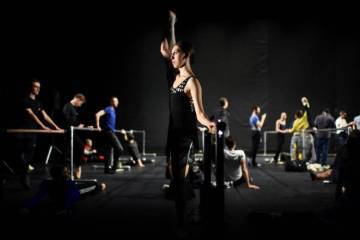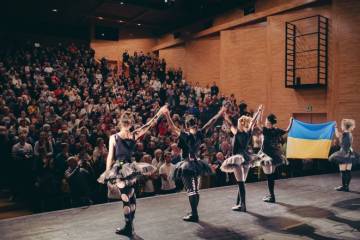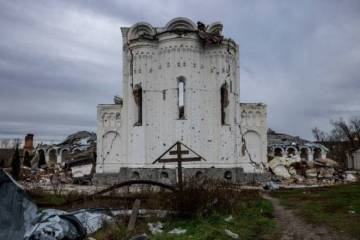A year ago, Russia was at war with Ukraine. On this occasion, Rima Abdul Malak, Minister of Culture, visited Kyiv on 23 February. “Ukrainians are fighting for their freedom and to save their heritage, their culture,” she said. Look back on a year of mobilization.
It was February 24, 2022. Russia was invading Ukraine, bringing several million refugees, including about 14,000 on French territory. Among them, Ukrainian artists, cultural professionals and journalists – but also Russian and Belarusian journalists threatened in their country of origin – whom the Ministry of Culture accompanies through several devices, equipped with a EUR 1.4 million fund. " This war is also cultural ” stressed Rima Abdul Malak, Minister of Culture, assuring that “ Europe must stand together for the preservation of Ukrainian culture ».
Mobilization has entered a new phase with the launch of the European Solidarity Fund for Ukrainian Films. Announced on 20 February 2023 on the occasion of the 73rd Berlinale by the Minister of Culture, Rima Abdul Malak, and his Luxembourg and German counterparts, this multilateral facility, endowed with 1 million euros, aims to support Ukrainian filmmakers, whose projects have been interrupted since the outbreak of Russian aggression on Ukrainian soil, and to foster creative and technical exchanges between professionals from contributing countries and Ukrainian professionals through co-productions. « This fund will help Ukrainian cinema to survive the war and produce new stories, carriers of imagination and hope ” said Rima Abdul Malak.
On Thursday 23 February, the Minister of Culture visited Kyiv, where she greeted the thousands of victims of the conflict. The Minister paid tribute to Frédéric Leclerc-Imhoff, a journalist killed in Donbass in Ukraine on May 30, 2022. “ All my support for journalists who risk their lives in conflict zones to inform us Among other things, the Minister of Culture must support the world of cinema, libraries and museums.
Emergency reception for Ukrainian artists, professionals, journalists and students
From the beginning of the conflict, emergency telephone lines were set up at the Atelier des artistes en exil to handle artists' requests and to answer first questions about their administrative status or their request for housing. Since March, nearly 1,300 people have benefited from this telephone support.
The first artists benefited from residencies at the Cité internationale des arts de Paris. « Welcoming artists in exile has always been a tradition for us. In 2016, we called for the structuring of an offer of support from this public », recalls Bénédicte Alliot, director of the Cité internationale des arts de Paris which welcomes fourteen Ukrainians in workshop-accommodation among 325 artists from all over the world. The Cité internationale des arts is now expanding its horizons and is working with cultural venues in the regions such as La Rochelle, and even abroad with a program of residencies shared with Berlin.
Special support was also provided to Ukrainian students, 161 of whom were welcomed into 37 schools under the ministry’s tutelage. This welcome complements the pause program (National emergency support programme for scientists and artists in exile in higher education, research or cultural institutions in France) also supported by the ministry. “ These students either arrive from Ukraine or were already on French territory and have, for example, difficulties accessing their bank account or maintaining links with their families ” explains Anne Bennet, Deputy Director of Training and Research at DG2TDC of the Ministry of Culture. In this area, the department helps obtain university scholarships and provides funding to schools that host these students. In 2023, Ukrainian students who continue their studies at institutions of higher education and culture benefit from grants and grants of common law that have come to take over the emergency fund.
Finally, to facilitate the integration of these artists and journalists, but also of all audiences, the Ministry’s General Delegation for the French Language and the Languages of France (DGLFLF) has partnered with 31 French Language Learning Centres (FLE) who gave the equivalent of 100,000 hours of classes.
Continue the creation and dissemination of Ukrainian culture
In addition to hosting, the ministry is committed to supporting the creation and dissemination of Ukrainian culture. Fourteen structures now allow artists to continue to create, these aids may include the purchase of material or the provision of places. Among the 48 artists supported by the Pause program, Olexandra Khalepa, an architect and art researcher, took up residence at the Villa Arson in Nice to continue his work on digital art. « Since I’ve been here, I’ve been able to continue my research, do online debates and readings with other Ukrainian artists, invite five here for a festival where we’ve presented ten works, and host more than twenty events online or in real ", she said.
The CNC - Centre national du cinéma et de l'image animée - has launched a programme to support filmmakers who have been unable to complete their work because of the outbreak of war while the Philharmonie de Paris, le Préau, Centre dramatique national de Normandie, in Vire, and the Théâtre de la Villein Paris, hosted Ukrainian ballets, groups and orchestras. “ Our main concern was that this emergency reception would allow artists to quickly enter the professional world Isabelle Nyffenegger, Deputy Director of European and International Affairs at the Ministry of Culture.
The National Library of France (BnF) decided to accompany the Ukrainian professionals. The institution recruited five people (librarians, researchers, computer scientists, etc.) who were already working in their home countries. “ Our will is to accompany these professionals and offer them tasks as close as possible to their desires and skills ” notes Ophélie Ramonatxo, Director of International Relations.
Protection of Ukrainian heritage
There are those who leave and those who stay. To protect Ukraine’s heritage, the department supported the aliph Foundation (International Alliance for the Protection of Heritage in Conflict Zones) to secure nearly 150 collections.
These operations require specific equipment such as cameras to document sites that are likely to be destroyed, protection boxes, digitization devices. Convoys were sent by establishments through icom. Work is also being conducted with UNESCO. In the autumn of 2023, Ukrainian conservatives will come to train themselves on safeguarding the endangered heritage.
After a 2022 focused on emergency reception, the objective is to propose more sustainable actions in 2023.
Launch of a European Solidarity Fund for Ukrainian Cinema
Thirteen European countries and the EFAD association (European Film Agency Directors) launched on 20 February a European Solidarity Fund for Ukrainian films. This multilateral fund aims to support Ukrainian filmmakers, whose projects have been interrupted since the outbreak of Russian aggression on Ukrainian soil, or for whom it is difficult to launch new ones in this context. This fund also aims to foster creative and technical exchanges between professionals from contributing countries and Ukrainian professionals through co-productions.
Endowed with 1 million euros for 2023, the programme is managed by the Centre National du Cinéma et de l'Image Animée (CNC), aims to finance cinematographic works in the development or finalisation phase. The aid will be awarded through a selection committee composed of five independent experts, which will meet twice during the year.
This announcement of the fund’s launch marks the opening of the first call for projects. Applications can be submitted to the TNC until 17 March. The results of this first session will be announced at the Cannes Film Festival in May.
The European Solidarity Fund for Ukrainian Films is implemented thanks to the collaboration and financial contributions of 15 film centres or Ministries of Culture from 13 countries and the association of EFAD: France (Ministry of Culture and CNC, coordinator), Dutch-speaking Belgium (VAF), French-speaking Belgium (CCA), Croatia (HAVC), Cyprus (Ministry of Culture), Estonia (Ministry of Culture), Germany (BKM), Greece (GFC), Ireland (Screen Ireland), Italy (MIC), Lithuania (Lithuanian Film Centre), Luxembourg (Film Fund Luxembourg), the Netherlands (Netherlands Film Fund), Portugal (ICA) and the EFAD association.




